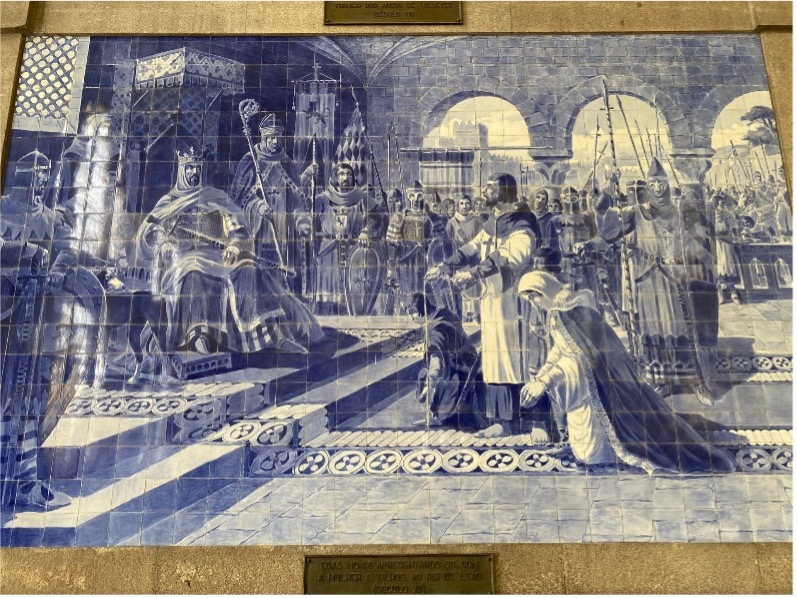In the heat of the spring sun of 1141, the armies of Afonso Henriques – who wanted independence for Portugal and to be its king – and Afonso VII of Castile and Leon, its overlord, stood face to face in the Vale de Vez. Before the battle started, Afonso Henriques proposed that instead of a battle, there should be a “bafordo”, a kind of medieval tournament in which the best knights from both sides faced each other and whose result was accepted by both sides to avoid unnecessary bloodshed.
Unfortunately, the contest did not have a clear winner. Egas Moniz, who had raised and educated Afonso Henriques, decides to intervene and assures to the King of Castile and Leon that it was all a misunderstanding and that his protege would gladly fulfill his duties of allegiance. Therefore no battle happened. But a year later Afonso Henriques broke the promise of his schoolmaster and invaded part of his lord's land.
Egas Moniz, seeing his promise broken, presents himself and his family with a rope around his neck to the king of Castile and Leon. The king seeing him ready to die with his lineage says: If my nobles had half your honor, our greatness would have no pair. I cannot punish you nor prevent the independence of a nation that has people like that.
So says the legend, begins the independence of Portugal.
Almost two hundred years later, Afonso IV was King of Portugal and his son Pedro fell in love with a young Spanish noblewoman named Inês.The relationship was not well regarded among some nobles as it could jeopardize the independence of Portugal. So they decided to consummate the murder of Ines.
A short time later the King dies and Pedro becomes King. He orders Inês to be unearthed and puts her beside him on the throne forcing all the Portuguese nobles to come and kiss the putrefying queen's hand. He executed the nobles who killed her, destroyed their palaces and ordered their land to be salted so that not even the weeds would grow there. Then he had the queen buried and built a marble sarcophagus – also one for him in front of hers – where they face each other forever.
Portugal’s history is rich in events and legends which are reflecting the race of a nation that in the 15th and 16th centuries, from their beautiful beaches, dominated the seas, built an empire, giving new worlds to the world.
This history is today present in its monuments and in the places where these events took place and is also telling about their way of life.
Peaceful and hospitable people who avoid bloodshed since its foundation until now – as the 1974 revolution which gave freedom to the Portuguese without having anybody killed – and being the first country in the world to abolish the death penalty.
A people who have feelings at their fingertips which resonate through their music and through their way they welcome foreigners who visit and live in Portugal. They don’t make a distinction between foreigners and nationals. Even prince Pedro did not distinct between him being Portuguese and Ines being a Spanish noble. This acceptance is still rooted in Portuguese people.
As for the courage to go by sea without great means or knowledge – which made them end up in Brazil when they tried to reach India – has not only brought wealth to the country but also enriched its phantastic Mediterranean cuisine with the food specialities and products they found, while navigating the world.
The courage to go into the unknown is still present today, making it easy to find in almost all countries a Portuguese community.
Portugal is not only beautiful beaches, phantastic food and mild climate, it is a country rich in history and a heritage that is worth getting to know , with a population that welcomes foreigners as they would like their relatives to be received in the countries to which they immigrated.


